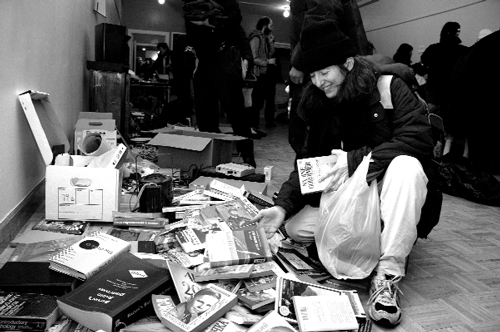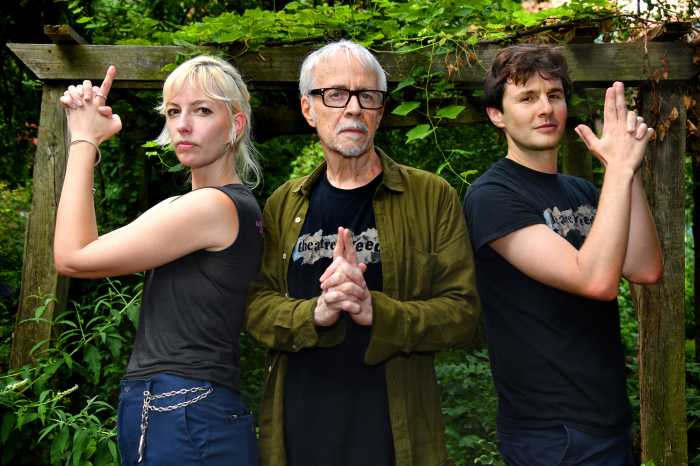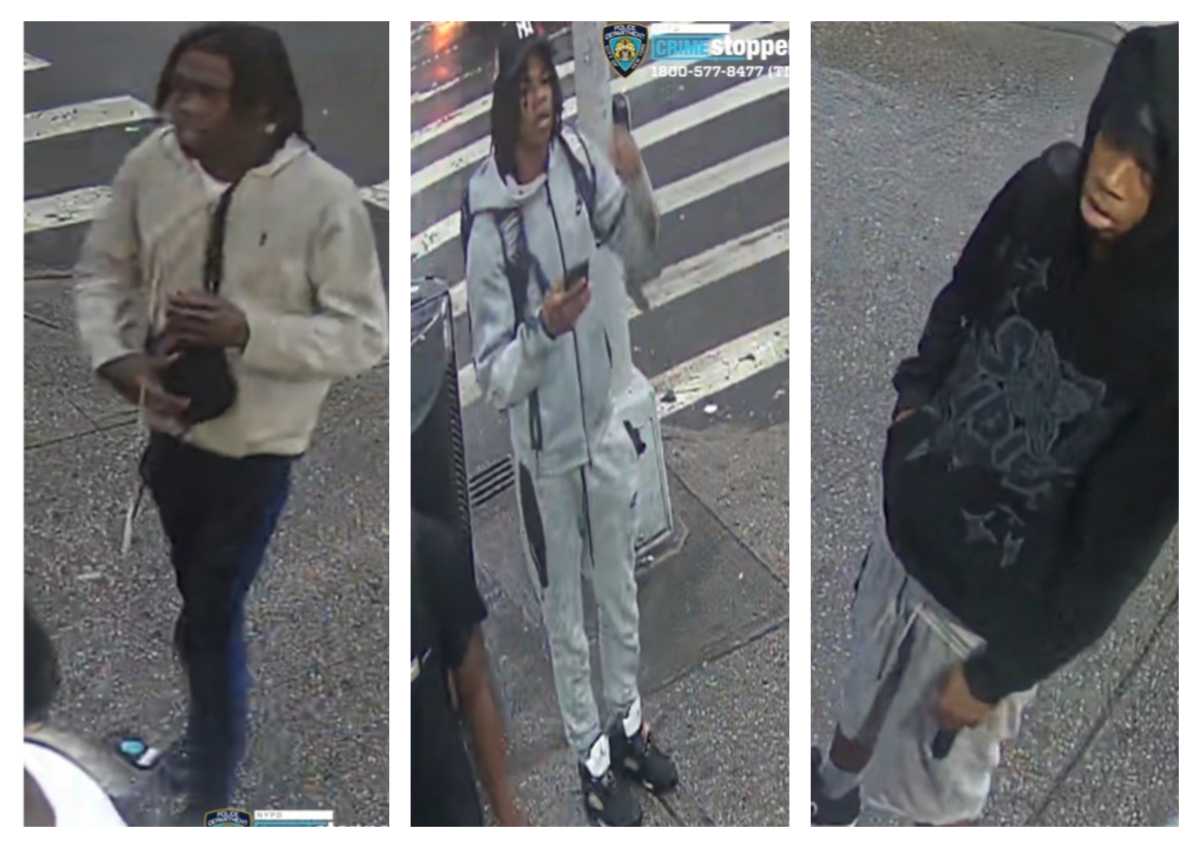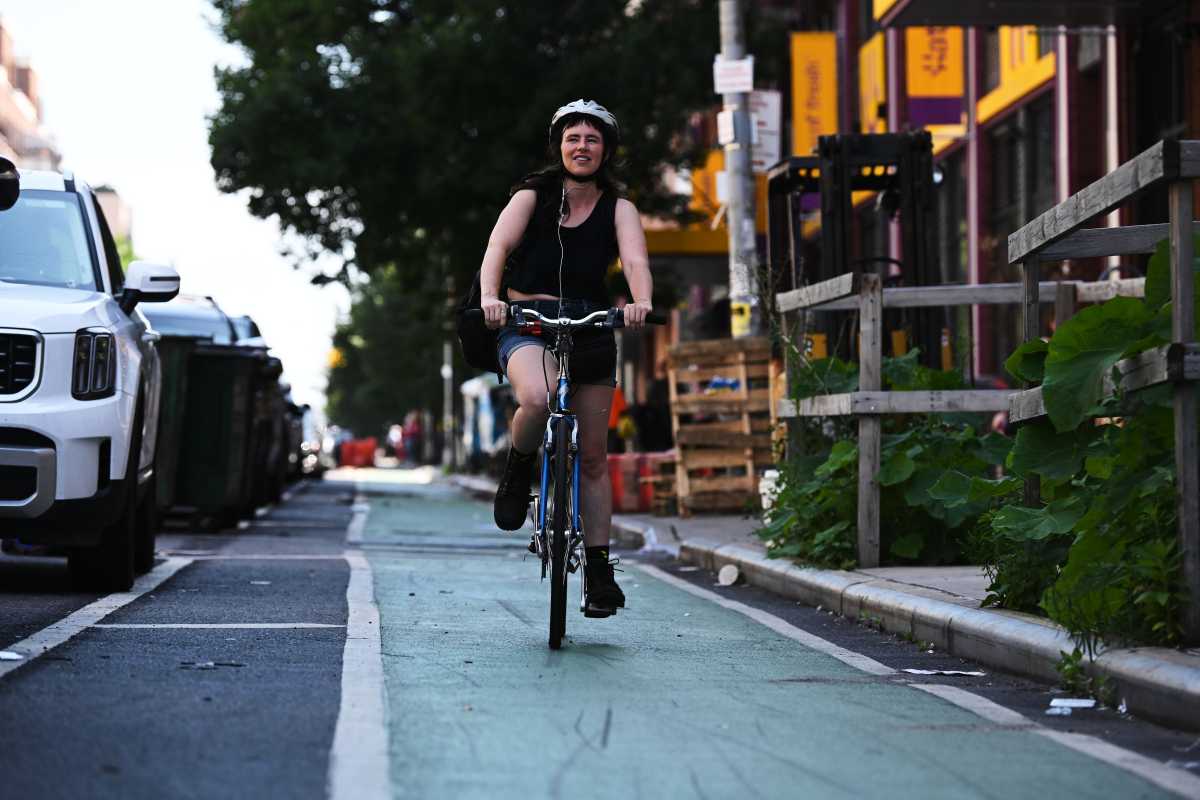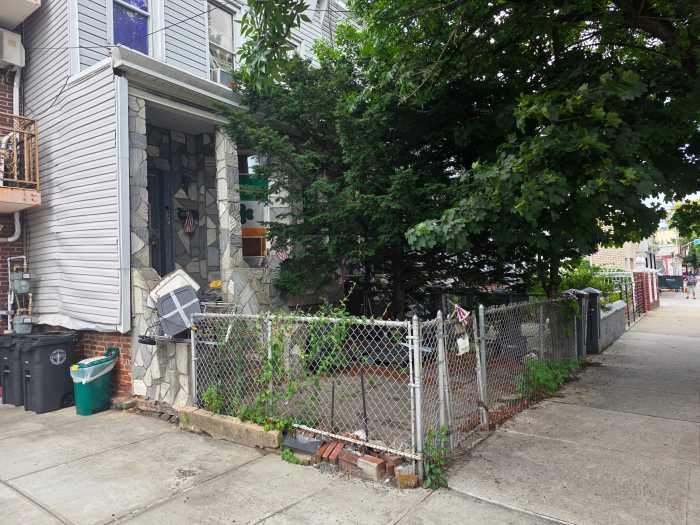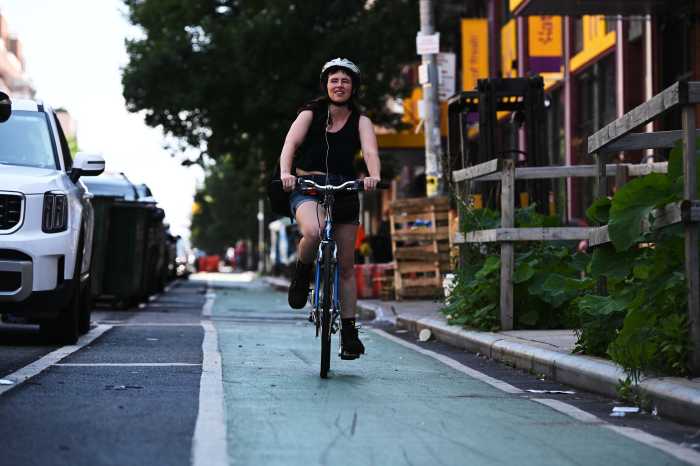By Jefferson Siegel
Books, above, and clothes, below, are some of the many items available for the taking at Freecycle Freemeets.
It’s several weeks after the holidays and you’re still stepping over piles of unwanted, unopened gifts. You’re wondering, who thought you’d look good in a Hawaiian shirt in the middle of winter? And why would someone give you a VCR when you don’t even have a TV? It’s all perfectly good merchandise, too good to throw out, but your blood type isn’t e-Bay. On a recent Saturday you would have found a sensible solution at the Freecycle Re-Gifting Freemeet.
Freecycle New York City is one of over 2,000 groups nationwide that match up people who want to get rid of their unwanted-but-useful possessions with others who are looking for that specific item.
Like many creative movements of the past decade, freecycling had its genesis on the Internet — specifically in virtual meeting rooms, akin to chat rooms, on Yahoo Groups. Christina Salvi, the New York City group “moderator,” explained how, in 2003, someone in Tucson, Az., started an online group, allowing members to post lists of useful items they wanted to give away instead of discarding. “The groups are all set up locally,” Salvi explained, “and the moderators are situated locally. Anyone who lives or works in New York City can join.” In order to make transfers easier, “smaller borough groups choose to limit members to their own area.” People can join by logging on (locally, the URL is: https://groups. yahoo.com/group/ freecyclenewyorkcity/) and then scan the postings of items requested or offered.
N.Y.C. Freecycle also branched out from an existing organization, “Recycle This!” which itself formed several years ago to protest the Bloomberg administration’s drastic reductions in curbside recycling pickups.
The Freecycle was held in the Sixth Street Community Center near Avenue C. Inside the large ground-floor room, one long table was filled with piles of clothing. Opposite were smaller tables holding toys, electronics, kitchen utensils, videos, CD’s and even a champagne flute. Against the back wall lay piles of shoes, from Adidas sneakers to Nine West dress shoes. One man knelt by a box of computer parts, sorting through cables, while another reached past him to retrieve a keyboard. Another man stood by a table, sorting through CD’s. On the floor was an eclectic selection of books; Russell Baker’s “Growing Up,” Nadine Gordimer’s “The Conservationist” and a phone-book-sized tome, “Bacon’s Radio Directory.”
The rules were simple: just about anything could be freecycled, as long as it was only gently used, in working order and legal. There were no limits on what could be brought in or taken out as long as one could carry it. Over the course of the afternoon, people were seen sorting through the piles and leaving, only to return an hour or two later to check out new arrivals. Ada, a neighborhood child, happily held a multicolored slinky and a pad of reflective paper. Nearby, a woman found a pair of silver sneakers that matched the color of her hooded sweatshirt.
A fascinating osmosis took place, as Salvi observed, “People come in with armloads and they leave with armloads.” Several volunteers stood by, reassuring newcomers that everything was free and there was no limit to what could be taken.
Madeline Nelson came from the West Village to volunteer and spent some time folding clothes. An early adopter of a pre-Freecyclers group, the vegetarian-oriented Freegans, she was bullish on the day’s trading.
“Here in America we’re wasting and throwing away so much that, in principle, you could live outside the money economy entirely.” She continued piling clothes on a table as she spoke. “In terms of consumer goods, people can live by gifting and scavenging. What you don’t need, you re-gift.”
The late afternoon light dimmed outside the rear windows but some tables remained sagging with donations. Melissa Meece, a co-organizer of the Freecycle, reassured a reporter that nothing would go to waste. The event was open to anyone, she explained, “even a charity.” And at the end of the day, she had made arrangements with several local charities to pick up or have delivered any and all leftovers. Piles of books and magazines were going to “Books Through Bars,” a Rivington St. group that provides printed media to jails. Clothing would go to the Catholic Worker’s Men’s Shelter on E. First St. and the Catholic Worker’s Women’s Shelter on E. Third Street, both near Second Ave. The Bowery Mission would take men’s clothing. Odds and ends would be going to the Women’s Prison Association on Second Ave. at Sixth St.
The Freecycle’s venue is itself an interesting story of recycling. A former synagogue that became vacant in 1978, it was reclaimed by a block association of single
mothers who were looking for a home. Using funding from several charitable foundations, they bought the building and created the Sixth Street Community Center. Historical preservation of the building is visible in the two narrow staircases inside the entrance, now painted in bright colors. Large marble slabs inscribed in Hebrew with the names of past congregants hang on the walls inside the entry room. Current programs at the center include twice-weekly yoga classes, education and discussion classes on food and health and a neighborhood co-op that offers members locally produced organic fruits and vegetables.
Near the end of a successful day, with future Freecycles already in mind, a tired but still-enthusiastic Salvi observed, “Everyone left excited about something they found.”



